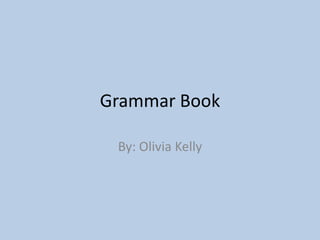
Grammar Book by Olivia Kelly
- 1. Grammar Book By: Olivia Kelly
- 2. Table of Contents • 1. Nacionalidades 2. Stem Changing Verbs 3. para 4. Indirect Object Pronouns 5. Pronoun Placement 6. Gustar 7. Affirmative and Negative Words 8. Superlatives • 9. reflexives • 10. affirmative tu commands + irregulars + pronoun placement • 11. negative tu command + irregulars + pronoun placement • 12. sequencing events • 13. Preterite • 14. Trigger Words • 15. Deder • 16. Modal Verbs • 17. Present Progressives • 18. Adverbs • 19. el futuro
- 4. Stem Changing Verbs e ie
- 5. Para • Use para (for in order to) to indicate the recipient of items. • EX: El regalo para tu mama. • EX: Vamos al restarante para comer.
- 6. Indirect Object Pronouns • Indirect Object Pronouns that tell to whom/what or for whom/what or for whom/what indirect object pronouns replace or accompany indirect objects. Singular Plural Me Me Te You(familiar) Le You(formal) him, her Nos Us Os You (familiar) Les You, them EXAMPLE: Olivia le compra una olla a su padre. Olivia le compra una olla.
- 7. Pronoun Placement When the pronoun goes along with a conjugated verb, the pronoun comes before the verb. But when the pronoun accompanies a sentence with an Infinitive, it can either go before the conjugated verb or Be attached to the end of the infinitive. Amor le comra una plata a su madre. Amor quiere comprar le una plata s su madre. Before attached
- 8. Gusta • What activities you like to do, use these with an infinitive • Me gusta • Te gusta • Le gusta • Nos gusta • Os gusta • Les gusta Talking about things that people like, change the form of gustar to match the singular or plural nouns for those things singular Me gusta la olla Nos gusta la olla Te gusta la olla Os gusta la olla Le gusta la olla Les gusta la olla Plural Me gustan las personas Te gustan las personas Le gustan las personas Nos gustan las personas Os gustan las personas Les gustan las personas The form of gustar matches the noun, not the speaker
- 9. Affirmative and Negative Words • Affirmative Words • Algo Something • Alguien Someone • Algun/Alguno some • Siempre Always • Tambien Also • Negative Words • Nada Nothing • Nadie No one • Ningun/ninguno None not any • Nunca Never • Tampoco Neither
- 10. Superlatives • To Express estremes with most adjectives, drop the final vowel and add the ending – isimo(a) • Rico(a) riqisimo(a) • Largo(a) larguisimo(a)
- 11. reflexives • To describe people doing things for themselves, use reflexive verbs • EX: Me lavo : Nos lavamos • EX: Te lavas : Os lavais • EX: Se lava : Se lavan
- 12. affirmative tu commands + irregulars + pronoun placement • Affirmative Tu Commands • Give instructions or commands to someone by using the • Affirmative tu commands of regular verbs • EX: Caminar !Comina! • EX: Comer !Come! IRREGULARS Decir di Hacer haz Ir ve Poner pon Salir sal Ser sal
- 13. negative tu command + irregulars + pronoun placement • Negative tu Commands • When you tell someone not to do • EX: Hablo !NO Hables! • EX: Vuelvo !No Vuelvas! IRREGULAR A few verbs have irregular negative Tu Commands. Dar(doy) No le des mi direccion a nadie
- 14. Sequencing Events • Primero-first • Entonces-then • Luego/despues-after • Por fin-finally • Antes de/despues de-before/after • Por la manana/tarde/noche- in /during the…
- 15. Preterito • It is a perfected action in the past. “snapshot” beginning and/or ending • Tocar Jugar Comerzar • Toque jugue comence • Tocaste jugaste comerzaste • Toco jugo comerzo • Tocamos jugamos comerzamos • Tocaron jugaron comerzaron
- 16. Trigger Words • Preterito Impertecto Un dia Una ves Ayer A veces Mientras Cada dia
- 17. Car, gar, zar • Tocar • Toque • Tocaste • Toco • Tocamos • tocaron Jugar Jugue Jugaste Jugo Jugamos Jugasteis jugaron Comenzar Comence Comenzaste Comenzo Comenzaste is comerzaron
- 18. Deder (Should: ought to) Yo: debo Tu: debes El: debe Ellos: deben EX: Debo barrer el suelo. EX: Dedes limpiar la cocina. EX: En vez de sacar fotos, debes ayudarme.
- 19. • When verbs are used in modal verb combinations • The 2nd verb is not conjugated, but rather left in the infinitive form. • You would never say “no puedo nado” • Deber – should, ought to, must • Desear – to desire • Necesitar- to need • Poder- could, can, might, be able to Modal Verbs
- 20. Present Progressives use pronouns with the present progressive • Estoy estoy esperando • Estas estas esperando • Esta esta esperando • Estamos estamos esperando • Estan estan esperando • EX: Las estoy sacando para algo muy importante
- 21. Adverbs To describe how something is done use adverbs Adjective Recient Frequente Facil Normal Especial Feliz Adverb Recientemente Frecuentemente Facilmente Normalmente especialmente
- 22. El futuro • Ir + a + infinitive Ellos van a jugar el partido de futbol a las seis. • Present tense with future time frame Juego en el partido manana. . • Future tense equivslent to will or shall pluse verb: FUTURE TENSE of regualr verbs E emos As eis A an Poner pondr- Tener tendr- Decir dir- Haber habr- Querer querr- Salir saldr- Venir vendr- Hacer har- Poder podr- Saber sabr- Irregular verbs